

11 Habits of an Effective Teacher. Carrie Lam , Academic Director, Teacher & Workshop Leader, Canada Posted 07/05/2014 10:12AM | Last Commented 08/12/2016 7:57AM I really appreciate teachers who are truly passionate about teaching.
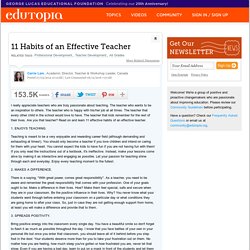
The teacher who wants to be an inspiration to others. The teacher who is happy with his/her job at all times. The teacher that every other child in the school would love to have. Teaching is meant to be a very enjoyable and rewarding career field (although demanding and exhausting at times!). There is a saying, "With great power, comes great responsibility". Bring positive energy into the classroom every single day. This is the fun part and absolutely important for being an effective teacher! Whether you are delivering a lesson, writing report cards or offering support to a colleague - give 100%.
Never fall behind on the marking or filing of students' work. Bioidentični hormoni - osobna priča — žensko zdravlje — Stranica 3 od 3 — Sensaklub.hr. Call Me Crazy But It Is Still About the Kids… I stopped using a punishment system in my classroom, when I realized I already knew who would get in trouble.

I stopped using a reward system in my classroom, when I realized I knew who would be rewarded. Few kids ever proved me wrong, instead they mostly stayed within the track that my management system had placed them in. And those that were always on the board? A Calm-Down Plan (For Parents) Life Skills for Children ages 2-18. Fresh Starts for Hard-to-Like Students. Even though your toughest students are just kids at the mercy of emotions they don't understand or can't control, it can be hard for a teacher to stay calm and not take these ongoing behavioral problems personally.
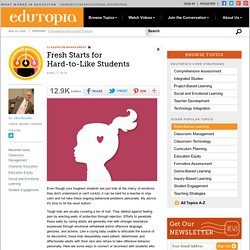
My advice: it's time to hit the reset button! Tough kids are usually covering a ton of hurt. They defend against feeling pain by erecting walls of protection through rejection. Efforts to penetrate those walls by caring adults are generally met with stronger resistance expressed through emotional withdrawal and/or offensive language, gestures, and actions. Like a crying baby unable to articulate the source of its discomfort, these kids desperately need patient, determined, and affectionate adults with thick skin who refuse to take offensive behavior personally. 1. Motivating the Unmotivated. Here's an all-too-common scenario: A group of elementary or middle school students are unruly, disrespectful and underperforming academically and socially in the classroom.
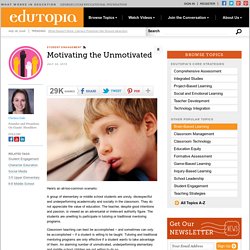
They do not appreciate the value of education. The teacher, despite good intentions and passion, is viewed as an adversarial or irrelevant authority figure. The students are unwilling to participate in tutoring or traditional mentoring programs. Classroom teaching can best be accomplished -- and sometimes can only be accomplished -- if a student is willing to be taught. In his book Dropping Out, Russell Rumberger lays out the societal consequences, including: Strategies for Helping Students Motivate Themselves. Editor's Note: This piece was adapted from Building a Community of Self-Motivated Learners: Strategies to Help Students Thrive in School and Beyond by Larry Ferlazzo, available March 21, 2015 from Routledge.
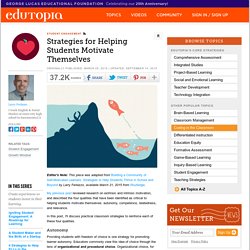
My previous post reviewed research on extrinsic and intrinsic motivation, and described the four qualities that have been identified as critical to helping students motivate themselves: autonomy, competence, relatedness, and relevance. 5 Innovative Ways To Create Positive Classroom Culture. Teaching three years in a public primary school and the previous two years in a private middle school, I’ve gotten the chance to spend time in two very different classroom environments.
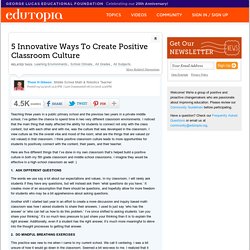
I noticed that the main thing that really affected the ability for students to connect not only with the class content, but with each other and with me, was the culture that was developed in the classroom. I view culture as the the overall vibe and mood of the room; what are the things that are valued (or not valued) in that classroom. I think positive classroom culture leads to more opportunities for students to positively connect with the content, their peers, and their teacher.
Here are five different things that I’ve done in my own classroom that’s helped build a positive culture in both my 5th grade classroom and middle school classrooms. 25 Lessons From Khalil Gibran That Can Transform Your Life. Today I would like to share with you 25 beautiful life changing lessons to learn from Khalil Gibran.

Author of one of my favorite books of all time, The Prophet. Enjoy. 1. Be thankful for the difficult times. Sir Ken Robinson: Creativity Is In Everything, Especially Teaching. From Creative Schools by Ken Robinson and Lou Aronica, published April 21, 2015, by Viking, an imprint of Penguin Publishing Group, a division of Penguin Random House LLC.
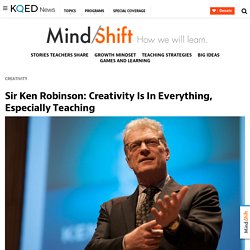
Copyright by Ken Robinson, 2015. Creative Teaching Let me say a few words about creativity. I’ve written a lot about this theme in other publications. Rather than test your patience here with repetition of those ideas, let me refer you to them if you have a special interest. Naučite od najboljih: Donosimo 7 tajni uspješne komunikacije. Dakako, svi mi komuniciramo, na ovaj ili onaj način, u gotovo svakom trenutku.

A New Study Claims People with Higher IQs Don't Require Large Social Circles. #1.

Spend time in nature. Find a beautiful place to take a daily walk or a jog. For the entire time you are out there, focus on what you see around you, the beauty of the trees or a body of water or the sun on your face. Notice the rhythm of your feet, the wind in your hair. Poor Students Need Homework - Robert Pondiscio. Of all the well-intentioned but unhelpful things people have ever said about education, perhaps the least helpful was from the father of progressive education himself. “What the best and wisest parent wants for his child, that must we want for all the children of the community,” wrote John Dewey.
“Anything less is unlovely, and left unchecked, destroys our democracy.” How Much is Too Much? There Is No Homework In Finland. It’s likely that most students would agree that homework is one of the biggest downfalls to going to school. When coming home from school, the last thing school students want to do is get out their books and do more work and it seems that they’re not the only ones who have that exact thought. It seems that Finland have jumped on board the same wavelength as students around the world as there is actually no homework in Finland and it’s actually having a surprising knock-on effect to their students. In Canada, the high school graduation rate is around 78 per cent and in America it comes in at around 75 per cent. Now, consider the fact that the graduation rate for students in Finland comes in at 93 per cent – showing a massive comparison between the countries.
Finland also happens to have the highest rate in Europe for students going to college (two out of three). So, does this manage to convince you that moving to Finland may be a really great idea? Study: Homework Helps Students Succeed in School, As Long as There Isn't Too Much. Durham, N.C. - It turns out that parents are right to nag: To succeed in school, kids should do their homework. Duke University researchers have reviewed more than 60 research studies on homework between 1987 and 2003 and concluded that homework does have a positive effect on student achievement. Harris Cooper, a professor of psychology and director of Duke's Program in Education, said the research synthesis that he led showed the positive correlation was much stronger for secondary students --- those in grades 7 through 12 --- than those in elementary school.
"With only rare exception, the relationship between the amount of homework students do and their achievement outcomes was found to be positive and statistically significant," the researchers report in a paper that appears in the spring 2006 edition of "Review of Educational Research. " "Even for high school students, overloading them with homework is not associated with higher grades," Cooper said. Homework is wrecking our kids: The research is clear, let’s ban elementary homework. “There is no evidence that any amount of homework improves the academic performance of elementary students.”
This statement, by homework research guru Harris Cooper, of Duke University, is startling to hear, no matter which side of the homework debate you’re on. Can it be true that the hours of lost playtime, power struggles and tears are all for naught? That millions of families go through a nightly ritual that doesn’t help? 6 Engaging End-of-Year Projects. I don't know about your students, but so many of mine, coupled with Senioritis, were done after state testing. (The well had run dry, no blood from a turnip -- all those sayings applied!) With just a few precious weeks left in the school year, what do you do to keep the kids energized and on board with learning? One thing I knew for sure when it came to my high school students: They had to feel as if they weren't actually doing work.
(Yep, I had to trick them.) And whatever you do plan, especially for secondary students, three elements are essential: choices, creativity, and constructing. Consider these projects (and I've included the cognitive demands): 4 Science-Backed Tips For Achieving Your Dreams. 5 2Share Synopsis How to keep your willpower strong so you can achieve your greatest goals. Whether it's New Year's resolutions or any other milestone we want to achieve, most of us give up on that career goal, diet, mindfulness practice, or exercise regimen we committed to however long ago. 10 Instant Ways to Calm Yourself Down. Log In. The Importance of Feelings. For decades, biologists spurned emotion and feeling as uninteresting. Scientists discover how to 'upload knowledge to your brain' How to Determine if Student Engagement is Leading to Learning.
Excerpted from the book, “UnCommon Learning: Creating Schools That Work for Kids,” by Eric Sheninger, published by Corwin, 2015. 9 Comebacks For Dealing With Selfish People. Introducing Slides Q&A: A new way to talk with your audience—not at them. Lako je biti školovan, teško je biti OBRAZOVAN! Školovanost se stiče bubanjem i upornošću, obrazovanje se stiče neprestanim širenjem vidika, radoznalošću i željom da od sebe napraviš svestranu, kvalitetnu osobu. Stop Innovating in Schools. Please. The Heart of Teaching: What It Means to be a Great Teacher. How ‘twisted’ early childhood education has become — from a child development expert.
Best of Teacher HELPLINE: 7 Ways to Show Appreciation for Your Colleagues This Week. Best of Teacher HELPLINE: 7 Ways to Show Appreciation for Your Colleagues This Week. Chris Anderson: TED's secret to great public speaking. Simon Sinek: How great leaders inspire action. What makes a TED Talk go viral? These 5 nonverbal patterns may explain. Remzi Musalam (Ramsey Musallam): 3 pravila za podsticanje učenja. 13 Other Jobs a Teacher Holds. Do as I Say, Not as I Do: Mindset Discerning in the Classroom - Institute for Entrepreneurship in Education. Angela Duckworth. B Archives - Body Language Dictionary. Živimo u kulturi straha. Freiresummary. Pedagogy of the Oppressed. Pedagogy of the Oppressed. A Great Teacher, Illustrated. What Makes A Great Teacher? Dunning-Krugerov efekt: Omiljena psihijatrijska dijagnoza političara i stranačkih mladeži - Društveni inženjering. Lazarev: Opasnost pomaganja drugima. 5 tips to improve your critical thinking (in TED-Ed GIFs)
5 tips to improve your critical thinking (in TED-Ed GIFs) Creativity Is Much More Than 10,000 Hours of Deliberate Practice. 10 Tips for Teaching Kids to Be Critical Thinkers. Learning {RE}imagined. What Teachers Can Gain When Students Design the Lessons. Erich Fromm on Humanistic Radicalism, the Common Laziness of Optimism and Pessimism, and the Need for Rational Faith in the Human Spirit. How Giving Students Choice During the Day Can Create Unstoppable Learning. Lessons From Finland: What Educators Can Learn About Leadership. Challenges of Creativity. The Difference Between Praise That Promotes Narcissism vs. Healthy Self-Esteem. Why Social and Emotional Skills Are Vital to Keep At-Risk Students on Track. Savjeti - Najbolje i najgore tehnike učenja - BUKA Magazin. Gmail - Free Storage and Email from Google.
What attitude prevents students from learning? - Quora. How have you overcome your difficulties in classroom management? - Quora. Teaching Methods: What are some of the best techniques for effective classroom management at the beginning of the school year? - Quora. Is it OK if a teacher says, 'I don't know' to students? - Quora. Why am I a slow learner and not confident about my intelligence? - Quora. What is a good strategy for absorbing and retaining information from a giant textbook you are self-studying for a test? - Quora. Feynman technique. 5 Productivity Strategies from the Mind of Richard Feynman. Learn Difficult Concepts With The ADEPT Method. Learn Difficult Concepts with the ADEPT Method.
Learning on steroids with Richard Feynman. The Feynman Technique Model — MATTYFORD. How to Use the Feynman Technique to Identify Pseudoscience. How to Use the Feynman Technique to Identify Pseudoscience. Maintaining a Productive Classroom Environment. Strategies that Motivate Students Connected to Proverbs. Social Emotional Learning and Classroom Management. Choice Motivates Students When Rewards and Punishment Don't Work. Reduce Student Discipline with Classroom Management. Successfully Managing Student Conduct. Handling Discipline Problems With Classroom Management. Reduce Student Discipline with Classroom Management. Sometimes Misbehavior Is Not What It Seems. In an Era of Conflict, Healing the World One Classroom at a Time. 25 Excellent Pieces of Advice That Most People Ignore. 10 Characteristics of People With High Emotional Intelligence. 7 Leadership Lessons From the Coach who Mentored Steve Jobs, Eric Schmidt, and Jeff Bezos.
Pustiti ne znači odustati. Točka preokreta. Top 4 Reasons Technology-Based Learning Implementations FAIL. Samopouzdanjem i tehnikom protiv napadača. Energetska i psihološka zaštita: kako mi sami utičemo na naše okruženje — Psihologija. Aikido životne lekcije. 20 savjeta jednog od najvećih psihologa. 20 mudrih savjeta psihologa Mihaila Litvaka - 20 mudrih savjeta psihologa Mihaila Litvaka - The Difference Between Praise and Feedback. One Size Does Not Fit All: The Need for Variety in Learning.